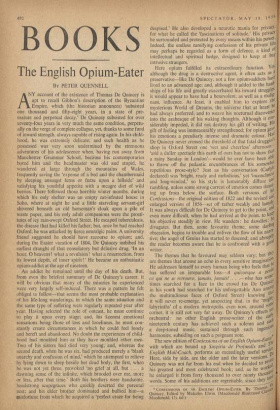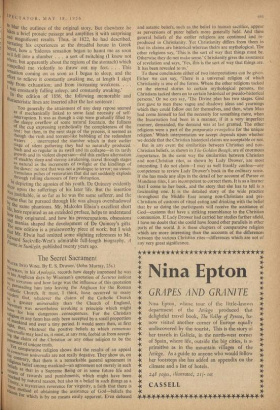BOOKS
The English Opium-Eater
BY PETER QUENNELL ANY account of the existence of Thomas De Quincey is apt to recall Gibbon's description of the Byzantine Empire, which (the• historian announces) 'subsisted one thousand and fifty-eight years, in a state of pre- mature and perpetual decay.' De Quincey subsisted for over seventy-four years in very much the same condition, perpetu- ally on the verge of complete collapse, yet, thanks to some fund of inward strength, always capable of rising again. In his child- hood, he was extremely delicate; and such health as he possessed was very soon undermined by the strenuous adventures of his adolescence when, having run away from Manchester Grammar School, because his contemporaries bored him and the headmaster was old and stupid, he wandered at large through the mountains of Wales, frequently saving the 'expense of a bed and the chambermaid by sleeping amongst ferns or furze upon a hillside' and satisfying his youthful appetite with a meagre diet of wild berries. There followed those horrible winter months. during which his only shelter was an empty rat-infested house in Soho, where at night he and a little starveling servant-girl shivered beneath an old horseman's cloak upon a pile of waste paper, and his only adult companions were the prosti- tutes of icy rain-swept OxfOrd Street. He escaped tuberculosis. the disease that had killed his father; but, once he had reached Oxford, he was attacked by fierce neuralgic pains. A university friend suggested he should have recourse to opium; and, during the Easter vacation of 1804, De Quincey imbibed his earliest draught of that consolatory but delusive drug. 'In an hour, 0 heavens! what a revulsion! what a resurrection, from its lowest depth, of inner spirit!' He became an enthusiastic opium-addict at the age of nineteen.
An addict he remained until the day of his death. But, from even the briefest summary of De Quincey's career. it will be obvious that many of the miseries he experienced were very largely self-induced. There was a pattern he felt obliged to follow—that seems the most probable explanation of his life-long wanderings, in which the same situation and the same type of suffering were regularly repeated year after year. Having selected the role of outcast, he must continue to play it upon every stage; and, his keenest emotional sensations being those of loss and loneliness, he must con- stantly create circumstances in which he could feel lonely and bereft and abandoned. lo doubt the experiences of child- hood had moulded him as they have moulded other men. TWO of his sisters had died very young; and, whereas the second death, when he was six, had produced merely a 'blank anarchy and confusion of mind.' which he attempted to relieve by lying down to sleep beside her dead body, the first, when he was not yet three, provoked 'no grief at all. but . . . a dawning sense of the infinite, which brooded over me, more or less, after that time.' Both his brothers were handsome, headstrong scapegraces who quickly deserted the parental nest; arid his elder brother dominated and bullied him—a misfortune from which he acquired a 'perfect craze for being despised.' He also developed a neurotic mania for privaeY. for what he called the 'fascinations of solitude.' His privacy he surrounded and protected by every means within his power. Indeed, the endless ramifying confusions of his private lifc may perhaps be regarded as a form of defence, a kind Of intellectual and spiritual hedge, designed to keep at btlY intrusive strangers.
Here opium fulfilled its extraordinary function. although the drug is a destructive' agent, it often acts as preservative—like De Quincey, not a few opium-addicts llaL lived to an advanced age; and, although it added to the hard' ships of his life and greatly exacerbated his inward struggle11' it would appear to have had a benevolent, as well as a malig' nant, influence. At least, it enabled him to explore the mysterious World of Dreams, the uni.sierse that at heart be had always preferred, and to weave his nocturnal discoveries into the arabesque of his waking thoughts. Although it CO' siderably impeded, it did not °destroy his gift of writing. 141s gift of feeling was immeasurably strengthened; for opium ga`l his emotions a peculiarly intense and dramatic colour. De Quincey never crossed the threshold of that fatal druggisi'5 shop in Oxford Street one 'Wet and cheerless' afternoon-. 'arid a duller spectacle this earth of ours has not to show Oar' a rainy Sunday in London'—would he ever have been 01° to throw off the pedantic encumbrances of his somewhol repetitious prose-style? Just as his conversation (Carl Y1''. declared) was 'bright, ready and melodious.' yet 'inconclusi", and long-winded,' so his style is lamentably diffuse all' rambling, unless some strong current of emotion comes thrust' ing up from below the surface. Both versions of 11 Confessions--the original edition of 1822 and the revised all` enlarged version of 1856—set. off rather weakly and lantebA'' It was always difficult for De Quincey to get to the point, all" even more difficult, when he had arrived at the point, to his objective steadily in view. Fie wanders : he dawdles: divagates. But then, some favourite theme, some darli0 obsession, begins to trouble and enliven the flow of his narr',1' tive; the angel of Genius has started to descend; and abrte; the reader becomes aware that Ile is confronted with a gr° writer. Y The themes that he favoured may seldom vary; but t-h c are themes that arouse an echo in every sensitive imaginad°11e' He addresses himself to every human being who feels that All, has suffered an irreparable loss—A quiconque a Peru' ce.qui tie se retrouve, janzais, jamais! . . .—who has som,e,', times searched for a face in the crowd (as De Quinc''',, in his youth had searched for his unforgettable Ann at11t/1"i', the multitudinous faces of Oxford Street) knowing it will never re-emerge. yet suspecting that. in the `1114111', labyrinths' of a modern metropolis, even now. around 01: corner, it is still not very far away. De Quincey's effects orchestral : no other English prose-writer of the el nineteenth century has achieved such a solemn and 00.5 a deep-toned music, 'sustained through such ingeni° harmonies, subsiding on such a poignant note. , The new edition of Confessions of an English 0 pium-Eacelite with which are bound up Suspiria de Profuhdis and English Mail-Coach, performs an exceedingly useful servl," Here, side by side, are the older and the later versions. 17.4. Quincey was not far from his end when he decided to re' Ited' his greatest and most celebrated book; and. as he wor Ile enlarged it from forty thousand to over ninety thousallo words. Some of his additions are regrettable, since the te. * CONFESSIONS OF AN ENGLISH OPIUM-EATER. By Thomas .1"),; Quincey. Edited by Malcolm Elwin. (Macdonald Illustrated Macdonald, 12s. 6d.) to blur the outlines of the original story. But elsewhere he takes a brief prosaic passage and amplifies it with surprising alit' magnificent results. Thus, in 1822, he had described, narrating his experiences at the dreadful house in Greek vi low a 'hideous sensation began to haunt me as soon as I fell into a slumber . . . a sort of twitching (I know not where, but apparently about the regions of the stomach) which ct3lope1led me violently to throw out my feet. . This nsari n coming on as soon as I began to sleep, and the eif?rt to relieve it constantly awaking me, at length I slept Only
from
I ,._ exhaustion; and from increasing weakness. w . . . Qs falling asleep. and constantly awaking.' kin the edition of 1856; the following memorable and ellarkiet :ristic lines are inserted after the last sentence : Too generally the attainment of any deep repose seemed a. s jf mechanically linked to some fatal necessity of self- interruption. It was as though a cup were gradually filled by the sleepy overflow of some natural fountain, the fullness uf the cup expressing symbolically the completeness of the rest : but then, in the, next stage of the process, it seemed as though the rush and torrent-like babbling of the redundant Waters . . interrupted the slumber which in their earlier Stage of, silent gathering they had so naturally produced. Such and so regular in its swell and its collapse—in its tardy growth and its violent dispersion—did this endless alternation of stealthy sleep and stormy awakening, travel through stages usnatural as the increments of twilight or the kindlings of the dawn : no rest that was not a prologue to terror; no sweet- tremulous lulous pulses of restoration that did not suddenly explode thr nigh rolling clamours of fiery disruption. dr 111 depicting the agonies of his youth. De Quincey evidently ?on the sufferings of his later life. But the insertion • ,was justifiable, in so far as he was the same sufferer, and the B.4y111r5e that he pursued through life was always overshadowed he same phantoms. Mr. Malcolm Elwin's excellent short i,"e. here reprinted as an extended preface, helps to understand '0w they originated, and how his preoccupations, obsessions 41,1 1,1;.`e a nias shaped the development of De Quincey's gifts. ne v edition is a praiseworthy piece of work; but I wish 1,114 '. Elwin had omitted, some slighting references to Mr. I";;;Iward Sackville-West's admirable full-length biography, A Fr Sunlight, published twenty years ago.



































 Previous page
Previous page